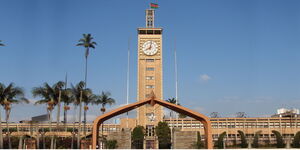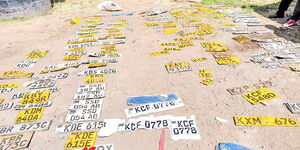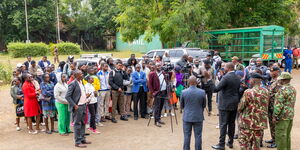The Kenya Forest Service (KFS) has explained the recent hike in park fees at the iconic Karura Forest amid concerns and pressure from stakeholders, including Kenyans.
In an interview on Tuesday, September 2, KFS Chief Conservator of Forests, Alex Lemarkoko, confirmed that park fees were inevitably affected after all payments for entry, annual passes, parking and other services were transferred to the government’s eCitizen platform.
According to Lemarkoko, the KFS, like other state institutions, was required to comply with the Public Finance Act (PFM), hence the shift to the eCitizen platform.
"Karura was not charging VAT before, but now, due to the involvement of the government and a county process, VAT must be paid," he explained.
To this effect, for every Ksh100 paid at the Karura Forest gate, an additional Ksh16 VAT is applicable.
Lemarkoko was also put to task to explain why fees rose from Ksh100 to Ksh166 despite VAT amounting to Ksh16. The Chief Conservator of Forests explained that it also had to do with the eCitizen platform, which subjects users to a convenience fee for every transaction.
He went on, "For eCitizen, we have what we call a convenient fee, which is a transaction fee. There are only two increases: the convenience fee and VAT. All transactions by KFS are required to be VAT compliant."
However, Lemarkoko also provided some clarity on how visitors can manage the costs despite the recent hike, particularly on the convenience fee. Because the Ksh50 convenience fee is basically for transactions, visitors to the forest stand to save some coins if they pay collectively.
"If 20 people came and paid at once, they would only pay once with one Ksh50 transaction," he explained.
On Monday, KFS clarified that operations at Karura Forest remained normal and smooth, with rangers working alongside community scouts from the Friends of Karura Forest (FKF) to manage access points and provide security.
The statement came despite Friends of Karura Forest threatening to take legal action against the Service, accusing the KFS of making wholesome changes to operations without any prior consultations.
But the KFS, in a subtle rejoinder, insisted the new system was part of national reforms to improve transparency, efficiency and service delivery not only among them but across all public institutions.
"This policy is mandatory and must be adhered to without exception as part of broader efforts to enhance transparency, accountability, and efficient service delivery across all government institutions," KFS said.
On the issue of tarmacking sections of Karura Forest, Lemarkoko clarified that the KFS was required to maintain road networks within its headquarters as per the Forest Management Plan (PFMP).
The issue of tarmacking sections of the forest has been a bone of contention with conservationists and environmentalists who are demanding more accountability and protection of the tree cover in the 2,570-acre forest.












